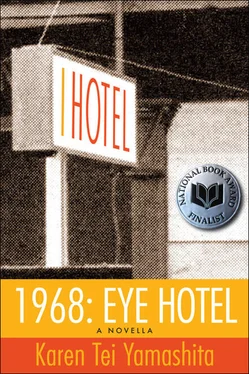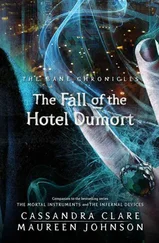At Judy’s house, Chen said to Paul, “You stay here with Judy. Tomorrow you edit the tape with her.”
“What?”
“For Edmund’s memorial in two days.”
“Edit? I don’t know how to do that.”
“She knows how. For you, it’s easy. Tell a story.” He spoke quietly but firmly. “Don’t leave her side until it’s finished. I’ll see you at the memorial.”
Paul fell asleep on the sofa. When he awoke he looked around and recognized all of Edmund’s things, but in a domesticated setting. This had been Edmund’s life since China, where he met Judy. She had arranged his practical life, become devoted to his work, learned to run a camera because he encouraged the idea. Paul thought she was stuck to him like a puppy dog. He groaned.
Two days later, Chen took his seat next to Paul at the memorial. “Nicely done,” he commented.
“She did all the work.”
“Where is she?”
“Behind the projector.”
“Good.”
“I haven’t eaten for three days.”
“Good.”
The chief editor from the East West newspaper got up and spoke about Edmund. Then someone from the Chinatown Youth Services. Then from the Chinese for Affirmative Action. Guys from the Tiao Yu Tai struggle were there. A woman from the Chinese Progressive Association, aka I Wor Kuen, and a guy who ran Everybody’s Bookstore for the Asian Community Center, aka Wei Min She, were also in line to speak. Old Red Guards were there too. A woman from the Health Services and even the old guys from the Laundrymen Association and the Six Companies chimed in. Wah Ching and the Joe Boys came in an uneasy truce and all the poets from CARP and Kearny. They all told the Lee family that Edmund Yat Min was a good son and exalted member of the community. It was maybe the first and last time that all these entities with competing political agendas and visions came together. In an amazing display of largess, they refrained on one side from denouncing Edmund as a reformist or on the other as a communist. Still, they all claimed some piece of Edmund to demonstrate the worthiness of their associations, shamelessly putting in a plug for Edmund’s support of garment workers or bilingual education or his fight against police brutality.
I guess you could say that Edmund was our slain Chinatown Romeo, sweet prince fallen between many houses. But maybe you could also say that this event was a testimony to the kind of person Edmund had become in a few short years. He was probably not, as they exaggerated, a man of great passion and unwavering commitment to the rights of oppressed people , but he was a young man of uncommon intelligence who used his talents to work daily on behalf of people in need. Why did he choose to do this? There had been endless meetings, strategy sessions, leafleting, articles to write, politicians to approach, folks to interview, statistical research, funding and legal matters, speeches and debates. And Edmund did all this while nominally working on his graduate studies in Chinese political philosophy and history. Chen knew Edmund’s genius and that Edmund, who alone among all his students could leave Chinatown, had chosen to stay. I am not sure if Edmund, had he lived, would not have eventually moved on, but these few years of which we speak were formative in the lives of many. A seed was planted. A moment of awakening.
Judy came over to hug Chen. “Thank you,” she said.
When she walked away, Paul complained, “Hey, how come . . . ? Oh, never mind.”
“Jealous?”
“Oh fuck you. That was my work too.”
“I could tell.”
“That wasn’t easy. He was my best friend.”
“I know.”
Paul looked angrily at Chen, whose eyes were quietly sad. “Take me home,” Paul said, shamefully. He tugged Chen’s sleeve. “Please,” he begged. “I’m famished.”
Although the pivotal moment theory might work for some, it might be overblown. As time drags on, other events step up to the plate, and one begins to wonder why any fork in the road presented the less traveled option. Chen knew his own confused path that, upon review, could not have been changed then and certainly not now. Chen was a man who lived in several exiles. As for Paul, he was still too young to know. Thinking about Paul and Chen, maybe you couldn’t exactly compare pivotal moments, but rather a single desire that united the two men: the desire to write.
The desire to write is linked to the desire to think and the desire to record. You could say it’s all the same thing, but you probably favor something or another. You who think you’re thinking are recording your thinking, but you who think you’re writing are recording your writing. You who think you’re recording are writing your record. It’s all stupidly obvious except for the desire. You could say it’s an obsessive trait, and once it kicks in, you’re stuck with it. The desire is selfish and personal. It has nothing to do with talent or giftedness. That becomes apparent or unapparent in the act, but the desire is an enigma. You say, I want to be famous; I want to be remembered; I want to speak; I want to communicate; I want to imagine; I want to remember. But writing itself is a strange way to accomplish any of that stuff, sitting alone for hours with a pen and paper or typewriter. It’s a complicated desire that becomes mixed up with the self, and Chen and Paul, if forced, would admit that it was a desire stronger than any human relationship, including the one between them.
Writing itself might be a laudable occupation, but the desire could be sinful—a lot of pretending and fakery. Mao was probably right to try to socialize writing, make it work for the people. Of course once they try to make rules about writing, you’ll go off and hide somewhere and write heresy. Still, having the desire is not the same thing as having something to write. The desire has to coincide with belief and necessity at a time and place in history. So the Poetry Boys Club hung around coffee houses, mostly with their desire, and defined a belief and necessity in a time and place.
“I think we need to present ourselves professionally,” Paul said. He could hear grumbling on the phone. “She doesn’t know us from Adam. Truth is, we’ve never actually done this, never published anything.”
“There’s the anthology in progress, and we’re going to publish her husband.”
“Besides which, we’re Chinese.”
“What difference does that make?” Jack’s voice rose.
“Did your folks wear I’m Chinese buttons?”
“Yeah, well—”
“We’ll pick up Kamiyama in Fresno.”
“Good idea.”
“Listen. You agree this is important.”
“John Okada publishes the first real serious novel in Asian America in 1957! It goes out of print with a couple lousy reviews. Nobody recognizes it’s a classic. And we discovered it!”
“Practically in a trash bin at McDonald’s.” Paul patiently recounted finding the discarded hardcover at the used bookstore on Turk and Market. Heroics were all part of it.
“It means we got a history! We’re yellow writers who come from a tradition of yellow writing!” Jack bellowed, then his voice got intense. “So this just in: Tuttle sent me a copy of a letter from Okada dated 1956. Okada says in the letter that he’s writing another novel.”
“So what happened to it?”
“It’s gotta be in his papers. Maybe an unfinished manuscript. Who knows! Can you believe this? We gotta get that manuscript!”
“So we’re not just asking her permission to reprint No-No Boy ?”
“Right! We gotta get permission to ransack her house!”
Jack threw a duffel and his guitar case into the trunk of Paul’s car. Then he hooked some hangers under plastic on the windows behind the driver’s seat.
Читать дальше












